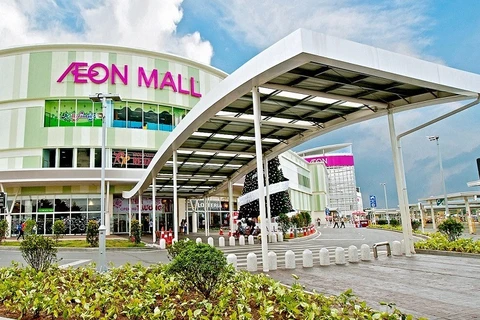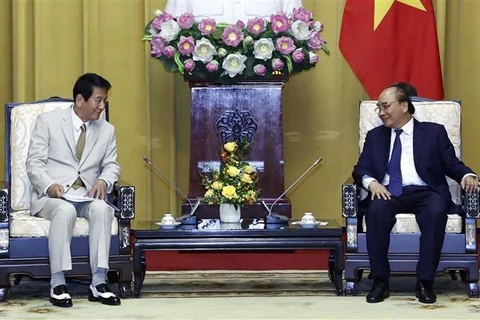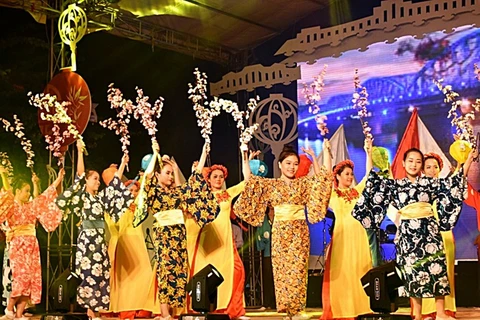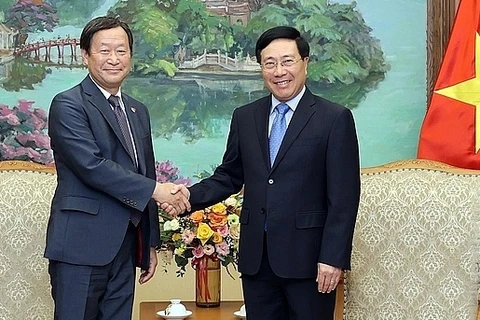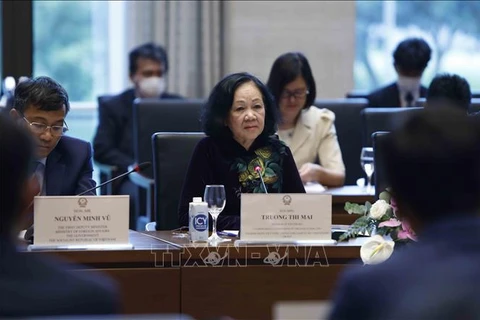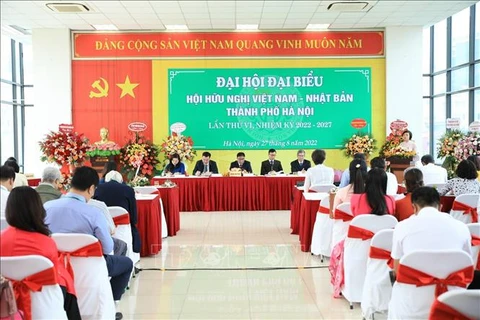 Minister of Labour, Invalids and Social Affairs Dao Ngoc Dung and Nakatani Gen, Assistant to the Japanese Prime Minister, discuss a cooperation programme on human resources. (Photo: VietnamPlus)
Minister of Labour, Invalids and Social Affairs Dao Ngoc Dung and Nakatani Gen, Assistant to the Japanese Prime Minister, discuss a cooperation programme on human resources. (Photo: VietnamPlus) Hanoi (VNA) – Minister of Labour, Invalids and Social Affairs Dao Ngoc Dung has suggested Japan expand areas receiving Vietnamese workers under Japan’s “specific skilled workers” programme.
During a meeting with Nakatani Gen, Assistant to the Japanese Prime Minister on issues of concern of Vietnam and Japan on September 20 in Hanoi, the Vietnamese official called on the Japanese side to consider expanding occupations receiving Vietnamese interns, especially those facing workforce shortages such as restaurant, hotel, and bus services, maintenance in urban railway and high-speed train sectors, construction, underground sewage treatment, and urban environment.
According to Dung, Vietnamese workers can quickly adapt to these industries and occupations and improve their skills if they undergo basic training.
He thanked Japanese agencies for coordinating with Vietnam in effectively implementing many cooperation programmes, including those on labour and human resources development.
According to the minister, the Ministry of Labour, Invalids and Social Affairs (MoLISA) has recommended the Vietnamese Government and National Assembly amend regulations on sending Vietnamese workers to work abroad and strictly handle enterprises that violate regulations and policies.
He suggested the Japanese side consider improving its programmes for accepting apprentices and specific-skilled labour programmes, especially re-evaluating the programme on receiving elderly care nursing workers; recruiting specific-skilled workers following regulations stated in the agreement signed between the two countries; and exempting residence tax and income tax for Vietnamese interns.
The Japanese official acknowledged Minister Dung’s suggestions, saying that he will make efforts to promote the implementation of the proposals mentioned above.
The two sides shared that promoting labour cooperation and human resources development has brought both countries practical economic and social benefits.
Vietnamese labourers working in Japan earn higher incomes and have the opportunity to access advanced techniques and technology and a professional working environment. They have also contributed to Japan’s socio-economic development and production and business activities, helping the country fix its labour shortage.
Japan is a favourite destination for Vietnamese workers. In recent years, the number of Vietnamese labourers sent to Japan accounts for 50% of the total workers working abroad every year. Moreover, this is one of the markets with the best working conditions and incomes.
Vietnam sends labourers to Japan through five channels: technical internship training programme; programmes to send nurse and caregiver candidates to Japan to work under the Vietnam-Japan Economic Partnership Agreement (VJEPA); specific-skilled labour programmes; technical labour and interpreter programmes; and construction and shipbuilding worker programmes.
Minister Dung had a working session with the Japanese Minister of Health, Labour and Welfare Katsunobu Kato in Tokyo on September 5.
During the meeting, Kato thanked the MOLISA for working closely with ministries and sectors of Japan in bringing Vietnamese apprentices to Japan to work over the years, affirming that Japan prioritises cooperation with Vietnam in receiving Vietnamese apprentices, skilled workers and engineers.
He said that his ministry had given strict punishments, including the withdrawal of licences, to businesses violating regulations in receiving foreign apprentices, especially acts of violence against foreign workers or unsatisfactory working conditions.
The same day, Dung had a working session with Hitoshi Kanamori, President of the Public Interest Foundation International Manpower Development Organization (IM Japan), during which he proposed that IM Japan continue to support Vietnamese interns while increasing the inspection of Japanese businesses to ensure good working and studying conditions for the interns.
The minister expressed his hope that the memorandum of understanding on the technical internship training programme for Vietnamese technical interns in Japan signed by the MOLISA and IM Japan in June will be implemented effectively, becoming a model of labour cooperation between the two countries.
Kanamori is committed to enhancing its management capacity and directing member enterprises to improve the living and working conditions for Vietnamese workers./.
